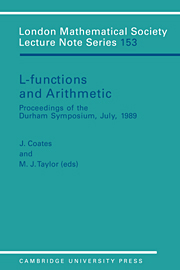Book contents
- Frontmatter
- Contents
- Preface
- Participants
- Lectures on automorphic L-functions
- Gauss sums and local constants for GL(N)
- L-functions and Galois modules
- Motivic p-adic L-functions
- The Beilinson conjectures
- Iwasawa theory for motives
- Kolyvagin's work for modular elliptic curves
- Index theory, potential theory, and the Riemann hypothesis
- Katz p-adic L-functions, congruence modules and deformation of Galois representations
- Kolyvagin's work on Shafarevich-Tate groups
- Arithmetic of diagonal quartic surfaces I
- On certain Artin L-Series
- The one-variable main conjecture for elliptic curves with complex multiplication
- Remarks on special values of L-functions
Remarks on special values of L-functions
Published online by Cambridge University Press: 18 December 2009
- Frontmatter
- Contents
- Preface
- Participants
- Lectures on automorphic L-functions
- Gauss sums and local constants for GL(N)
- L-functions and Galois modules
- Motivic p-adic L-functions
- The Beilinson conjectures
- Iwasawa theory for motives
- Kolyvagin's work for modular elliptic curves
- Index theory, potential theory, and the Riemann hypothesis
- Katz p-adic L-functions, congruence modules and deformation of Galois representations
- Kolyvagin's work on Shafarevich-Tate groups
- Arithmetic of diagonal quartic surfaces I
- On certain Artin L-Series
- The one-variable main conjecture for elliptic curves with complex multiplication
- Remarks on special values of L-functions
Summary
INTRODUCTION
This article does not represent precisely a talk given at the symposium, but is complementary to [DenS]. Its purpose is to explain a setting in which the various conjectures on special values of L-functions admit a unified formulation. At critical points, Deligne's conjecture [Del2] relates the value of an L-function to a certain period, and at non-critical points, the conjectures of Beilinson [Bel] give an interpretation in terms of regulators. Finally, at the point of symmetry of the functional equation, there is the conjecture of Birch and Swinnerton-Dyer, generalised by Bloch [Bl2] and Beilinson [Be2], in which the determinant of the height pairing on cycles appears.
Both the periods and the regulators are constructed globally, and their definitions are in some sense archimedean. The height pairing, on the other hand, is defined as a sum of local terms. Our aim is to show how all of these objects—periods, regulators, and heights—may be interpreted as ‘periods of mixed motives’.
That such a reformulation is possible in the case of regulators is clearly indicated in the letter of Deligne to Soulé [Del3], Perhaps the only novel feature of our account is to regard the mixed motives as primary objects, rather than the Ext groups. It is appropriate to mention in this connection work of Anderson and of Harder [H], in which certain particular mixed motives arising in the study of the cohomology of Shimura varieties are investigated.
- Type
- Chapter
- Information
- L-Functions and Arithmetic , pp. 373 - 392Publisher: Cambridge University PressPrint publication year: 1991
- 9
- Cited by



